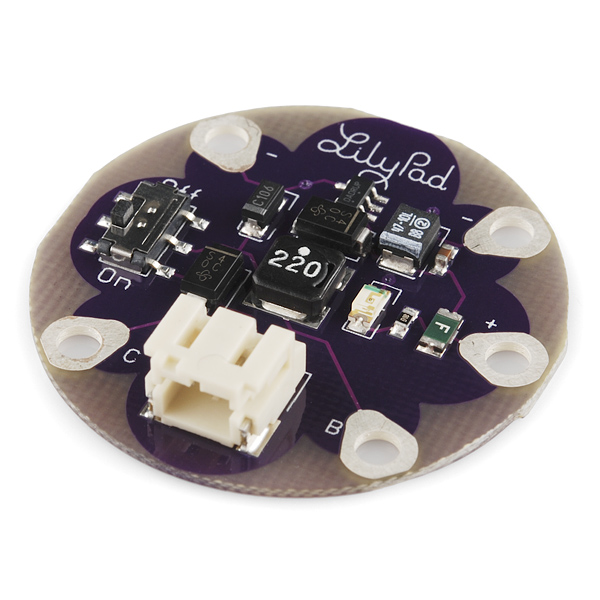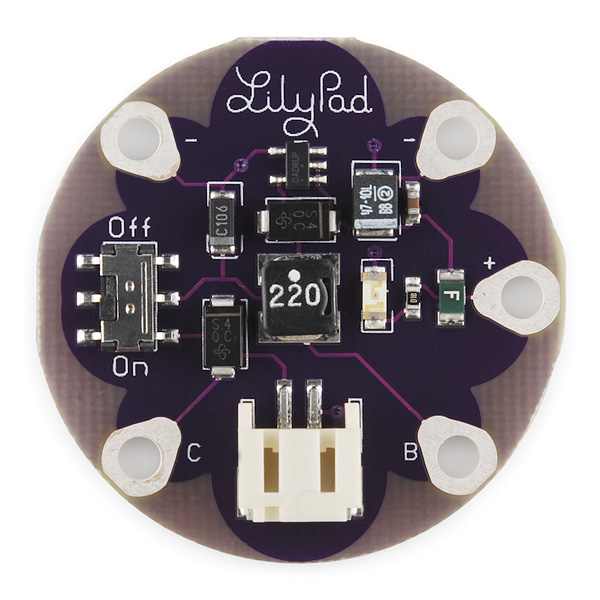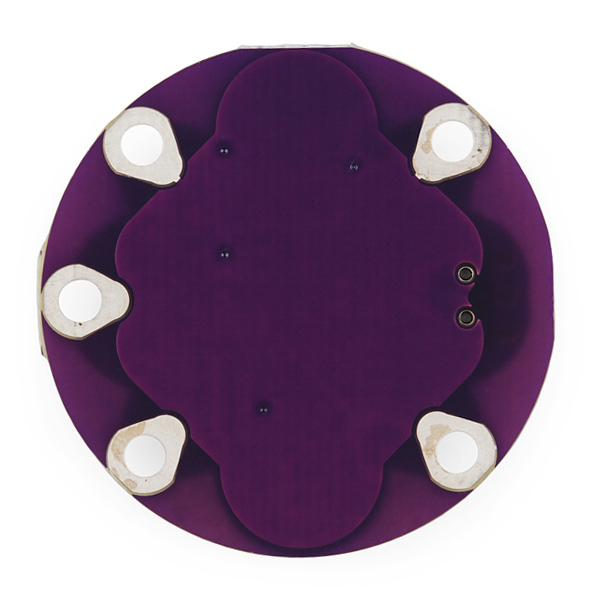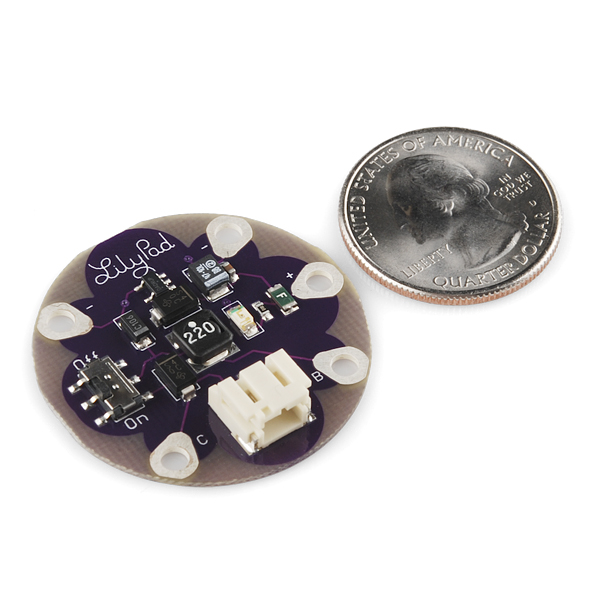LilyPad LiPower
A small, but very mighty power supply. This board was designed to be as small and inconspicuous as possible. The nice thing about LiPower is the ability to use rechargable Lithium Polymer batteries. These batteries are smaller, flatter, and last much longer than a AAA battery. Attach a single cell LiPo battery, flip the power switch, and you will have a 5V supply to power your LilyPad network. Good up to 150mA. Short circuit protected.
This board has a JST connector, which will connect to our JST terminated single cell 3.7V LiPo batteries. It also has terminals for charging the LiPo battery with one of our LiPo chargers.
LilyPad is a wearable e-textile technology developed by Leah Buechley and cooperatively designed by Leah and SparkFun. Each LilyPad was creatively designed to have large connecting pads to allow them to be sewn into clothing. Various input, output, power, and sensor boards are available. They're even washable - but be sure to remove the battery!
Note: A portion of this sale is given back to Dr. Leah Buechley for continued development and education of e-textiles.
- 18mm outer diameter
- Thin 0.8mm PCB
- Schematic
- Eagle Files
- LilyPad LiPower Sticker Sheet PDF
- All LilyPad Product Sticker Sheet PDF
- GitHub
LilyPad LiPower Product Help and Resources
Core Skill: DIY
Whether it's for assembling a kit, hacking an enclosure, or creating your own parts; the DIY skill is all about knowing how to use tools and the techniques associated with them.
Skill Level: Noob - Basic assembly is required. You may need to provide your own basic tools like a screwdriver, hammer or scissors. Power tools or custom parts are not required. Instructions will be included and easy to follow. Sewing may be required, but only with included patterns.
See all skill levels
Core Skill: Electrical Prototyping
If it requires power, you need to know how much, what all the pins do, and how to hook it up. You may need to reference datasheets, schematics, and know the ins and outs of electronics.
Skill Level: Rookie - You may be required to know a bit more about the component, such as orientation, or how to hook it up, in addition to power requirements. You will need to understand polarized components.
See all skill levels
Comments
Looking for answers to technical questions?
We welcome your comments and suggestions below. However, if you are looking for solutions to technical questions please see our Technical Assistance page.
Customer Reviews
No reviews yet.





Do I need something like this, or can I just cut my liPo battery's wire and solder it directly on the lilypad. I'm using the 850mAH Polymother Lithium Ion battery.
I would like to attach a solar cell to a Lipower in order to charge the battery attached to Lipower. Do you think the battery can handle to be charged with variable voltage? Thanks!
I got the impression in another thread that there could be a problem connecting the USB programmer to an Uno while it was also connected to a LiPower board with a battery. Is that the case with the LilyPad and this board, or is it OK to have both USB and LilyPad LiPower connected to my LilyPad at the same time? Thanks!
Noob question, but what is this product intended for? Can it be used to light up LEDs without a LilyPad main or simple board? OR is it just to give the lilyPad a steady 5V?
Both. You would need to make sure your LEDs can handle 5V, and you would only be able to turn them on or off, but yes, you could run just LEDs or actually power a main board off of this.
Is it possible to charge a battery using this and the main board? And, what's the difference between this and the "LilyPad Simple Power"? Thanks...
The simple power does not have a built in battery, you use your own battery and the simple power makes it useable for LilyPad.
Member #542698 as far as I can see, the "LilyPad LiPower" does not have built in battery neither, so I still keep the same question: What's the difference between "LilyPad LiPower" & “LilyPad Simple Power”?
The LiPower boosts the 3.7V signal from the lipo up to 5V. The Simple Power just outputs 3.7V.
I am a little confused. Under 'Dimensions' it says 18mm OD but in the photo it appears to be considerably larger than the standard 24.2mm size reference. What's with that?
Is the LiPo good for 150ma or 100ma? - The description says 150ma, however the schematic says 100ma.
Hi Sparkfun,
I am an industrial designer student designing a female scooter jacket with LED's. I am looking for power sources, and as my knowledge in electronics is limited I am addressing my questions to you.
I have purchased the power case DEV-11259 for the AAA battery. I have 4 circuits with respectively 40, 32, 30 and 16 Lilypad LEDs (in parallel). From the LED datasheet (the DEV-100-series), I see that forward voltage is 2V. Since I have 4 circuits, do I have to use 2 Lilypad micro controllers? The 4 circuits have to be independent of each other.
Circuit 1, Two lines of LEDs on arms: 40 Circuit 2: Two lines of LEDs in front: 32 Circuit 3: Two lines of LEDs in back: 30 Circuit 4: Cluster of LED's on back-arms: 16
Maximum number of LED's on at one time is 102. The number of LED's can be adjusted down if necessary. I recon the rechargeable Lithium would be better for this application since it says that it lasts longer.
I wonder, is 102 an incredible high amount of LED's for one Lilypad LiPower source? How long will the power source last with 102 LED's on? Or X LEDs? I will be happy to send you a schematic of the jacket.
How sturdy are the LEDs? Can they really last the 1000 operation hrs when placed in a jacket and with the use that comes with a jacket? Also referring to the recommendation of using the LEDs within 1,5 year after purchase. Another question: Do you provide LEDs that can be clipped onto a textile circuit instead of sewn on? In that way, I think it would be easier to change LEDs after their operation life, or in case of a defect.
Thank you for your time.
Regards, Janniche
Did you ever figure out the answer to this? I want to light up 20 lilypad white LEDs in parallel and am wondering whether this power source will work and how long the battery will last if it will.
I'd recommend asking in a forum!